|
|
|
Sort Order |
|
|
|
Items / Page
|
|
|
|
|
|
|
| Srl | Item |
| 1 |
ID:
170952
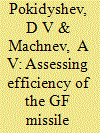

|
|
|
|
|
| Summary/Abstract |
The authors present the hierarchy analysis method as a means of assessing the efficiency of the Ground Forces (GF) Missile Forces control subsystem
|
|
|
|
|
|
|
|
|
|
|
|
|
|
|
|
| 2 |
ID:
139421
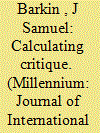

|
|
|
|
|
| Summary/Abstract |
This article suggests to quantitative methodologists that the tools that they use (and often others they do not) are more broadly applicable than is often assumed; to reflexivist researchers that there are many more tools available to their research than are often seen as appropriate; and to the IR discipline writ large that most of the disciplinary thinking about the relationships between research, ontology, epistemology, methodology and methods is unnecessarily narrow. Our core goal is to reveal the problematically inaccurate nature of both the qualitative/quantitative and the positivist/post-positivist divides, as well as of traditional methods training. We suggest that the ability to pair, and the utility of pairing, quantitative (traditionally neopositivist) methods with critical (traditionally non-neopositivist) theorising makes this intervention. To this end, the article begins with discussions of the relationships between epistemology and method in IR research. We continue on to frame a disunity of social science in the quantitative/qualitative divide, which lays the groundwork for a section rethinking traditional understandings of how methods, methodology, and epistemology relate. We then make the case for the utility of methods traditionally classified as ‘quantitative’ for critical research in IR. The article concludes by discussing the transformative implications of this understanding for critical theorising, and for theorising knowledge within disciplinary IR.
|
|
|
|
|
|
|
|
|
|
|
|
|
|
|
|
| 3 |
ID:
119986
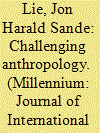

|
|
|
|
|
| Publication |
2013.
|
| Summary/Abstract |
Ethnography and anthropology are intrinsically linked, but recently other disciplines have started to draw inspiration from anthropological methods. The ongoing ethnographic turn in International Relations has spurred debate on what ethnography is, what it means and entails in practice, and how to apply it in International Relations. Some assert that the ethnographic turn could not have taken place without adopting a selective and antiquated notion of ethnography; others counter that this argument draws on a caricatured version of ethnography. This article offers one anthropologist's reflections on these issues, drawing on ethnographic work within an international organisation and a state apparatus - both of which are areas of study more common in International Relations than in anthropology. This is not an International Relations turn of anthropology, but the practical and methodological challenges it involves are relevant to the ethnographic turn of International Relations and the disjuncture between the ethnographic ideals and anthropological practice.
|
|
|
|
|
|
|
|
|
|
|
|
|
|
|
|
| 4 |
ID:
148268
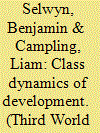

|
|
|
|
|
| Summary/Abstract |
This article argues that class relations are constitutive of development processes and central to understanding inequality within and between countries. Class is conceived as arising out of exploitative social relations of production, but is formulated through and expressed by multiple determinations. The article illustrates and explains the diversity of forms of class relations, and the ways in which they interplay with other social relations of dominance and subordination, such as gender and ethnicity. This is part of a wider project to revitalise class analysis in the study of development problems and experiences.
|
|
|
|
|
|
|
|
|
|
|
|
|
|
|
|
| 5 |
ID:
034590


|
|
|
|
|
| Publication |
New Jersey, Prentice Hall, Inc., 1963.
|
| Description |
ix, 661pHbk
|
|
|
|
|
|
|
|
|
|
|
|
Copies: C:1/I:0,R:0,Q:0
Circulation
| Accession# | Call# | Current Location | Status | Policy | Location |
| 010009 | 910.133/ALE 010009 | Main | On Shelf | General | |
|
|
|
|
| 6 |
ID:
100057
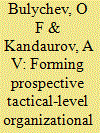

|
|
|
| 7 |
ID:
157107
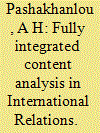

|
|
|
|
|
| Summary/Abstract |
Content analysis has once again come to the forefront of discussions regarding methods in International Relations (IR). The first wave of content analysis in IR lasted from the 1940s to the 1960s and was marked by a commitment to quantitative and manual analyses. The second wave of content analysis appeared at the start of the third millennium and continues to pervade the discipline. As with the first wave, it proceeds in a predominantly quantitative manner but emphasizes computer-assisted analysis rather than manual analysis. Critics and advocates of the method alike have, highlighted numerous shortcomings with these approaches. In order to address these limitations, the present investigation argues for a fully integrated content analysis that has the potential to ameliorate the identified weaknesses that have hitherto plagued the method. It accomplishes this task by combining all facets of the method: quantitative, qualitative, manual, and computer-assisted content analyses within a single research project.
|
|
|
|
|
|
|
|
|
|
|
|
|
|
|
|
| 8 |
ID:
172341


|
|
|
|
|
| Summary/Abstract |
This article proposes a method for analysing museums as sites of intimate and colonially-produced international relations. Beginning with fieldwork that approaches museums as sites through which people intimately encounter the objects, institutions, selves and others of international politics, we explore how intimacy can be ‘read’ as socio-sexual affect, scales and proximities, and colonial differentiation/racialisation. The article is grounded in fieldwork at the British Army Royal Engineers Museum in Kent, UK, conceptualised as an assembly of, following Stoler, imperial debris. We explore how certain museum exhibits work as intimate ‘organising objects’, locating the museum collection, and those who visit or are excluded from it, within the intimate circulations of imperial and colonial violence. The article makes two core contributions: first, responding to recent literature in IR on museums we propose a framework for understanding how museums and exhibitions function as everyday sites of coloniality and racialisation. Second, we propose that approaching intimacy as a method is instructive for fieldwork in international relations (including museums) which takes the colonial constitution of the global/local seriously.
|
|
|
|
|
|
|
|
|
|
|
|
|
|
|
|
| 9 |
ID:
139419
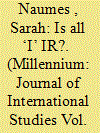

|
|
|
|
|
| Summary/Abstract |
Narrative approaches to International Relations have steadily increased in popularity in recent years. As narrative has gained further acceptance among other methodological traditions in International Relations, it has also provoked questions about the sort of restrictions that should be placed on academic writing in general and narrative writing in particular. Narrative approaches have faced challenges that ask whether they allow room for critique or if they necessarily turn into standpoint epistemologies. This author views narrative approaches as both valid and necessary in addition to the stable of other methods utilised in International Relations scholarship. However, in order for narratives to contribute effectively, they must be subject to critique. This article proposes two questions that both authors and readers should ask when engaging with narrative: 1) Does the narrative disrupt notions of congruity in political thought? Does it bring to light contradictions that may otherwise be ignored? 2) Does the narrative make room to incorporate those who have been excluded from political science discourse? Through asking these questions, International Relations scholars who utilise narrative approaches can open the field to novel lines of inquiry.
|
|
|
|
|
|
|
|
|
|
|
|
|
|
|
|
| 10 |
ID:
120002
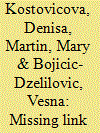

|
|
|
|
|
| Publication |
2013.
|
| Summary/Abstract |
The concept of human security continues to defy definitional clarity at the same time as it is being embraced by policymakers. This article proposes a practice-grounded approach that focuses on investigative method as a way of linking conceptual understanding of human security to the research process. Probing the 'actorness' of individuals in volatile contexts, a study of insecurity in Kosovo shows how dialogue can be applied as a research tool to access and assess human security in the field. Dialogue permits recognition of the power of the researched in the construction of knowledge of security, and accordingly reflects the conceptual shift represented by human security from states to communities and individuals. In the Kosovo study, dialogic research captured individual agency in the face of pervasive insecurity and revealed contradictory effects of such agency. This led to the formulation of the idea of the multidirectional security marker as a means of understanding experiences of insecurity in relation to strategies to combat it. Three such markers - self-reliance, informality and community solidarity - emerged and are analysed in the case of Kosovo. Simultaneously denoting restrictions on people's security and possibilities for overcoming those very same limitations, the markers express the agential dimension of human security and show how agency and security interact.
|
|
|
|
|
|
|
|
|
|
|
|
|
|
|
|
| 11 |
ID:
123193
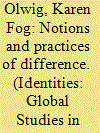

|
|
|
|
|
| Publication |
2013.
|
| Summary/Abstract |
The notion of diversity, which has gained increasing prominence in recent years, promises to rejuvenate migration research in terms of the theoretical and methodological lines of enquiry pursued, the empirical data generated and the interpretations and knowledge produced. By pointing to the existence of many possible forms of differentiation and belonging in social life, it offers a productive alternative to the ethnic framing that has characterised much migration research, whether large-scale quantitative surveys or small-scale ethnographic community studies. It, furthermore, can bring into sharper focus the significance of the temporal and spatial aspects of migration and related processes of inclusion and exclusion. Finally, it can stimulate the development of new, innovative research methods. There is still a need, however, to explore the complex nature of diversity as an empirical phenomenon and analytical concept. This is discussed with particular reference to mobility, contexts of sociality and the politics of academic concepts.
|
|
|
|
|
|
|
|
|
|
|
|
|
|
|
|
| 12 |
ID:
143716
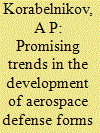

|
|
|
|
|
| Summary/Abstract |
The author outlines a series of promising trends in the development of aerospace defense forms and methods in the Russian Federation and suggests expedient methodological changes in the current approach to organizing the latter.
|
|
|
|
|
|
|
|
|
|
|
|
|
|
|
|
| 13 |
ID:
139416
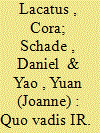

|
|
|
|
|
| Summary/Abstract |
This introduction to the special conference issue for the 2014 Millennium Conference on Method, Methodology and Innovation aims to provide a background to the conference theme, as well as the articles included in this issue. It hence serves to outline the reasoning for holding a conference on method and methodology in International Relations (IR), situates the present debate within a broader context, elaborates on why Millennium is a journal that is well suited to host such a debate, and offers an overview of the different contributions made in this issue.
|
|
|
|
|
|
|
|
|
|
|
|
|
|
|
|
| 14 |
ID:
162564
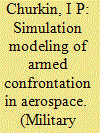

|
|
|
|
|
| Summary/Abstract |
This paper examines the scope of the simulation modeling method to propose the general theoretical aspects and grounds of creating and applying simulation modeling of armed confrontation by troop/force groupings in aerospace.
|
|
|
|
|
|
|
|
|
|
|
|
|
|
|
|
| 15 |
ID:
147797
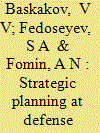

|
|
|
|
|
| Summary/Abstract |
The authors review different types of planning as a control function. They provide an essential analysis of strategic and budgetary strategic planning, directed toward creating an integrated target program for the financial activity of enterprises, including those of the defense-industrial complex.
|
|
|
|
|
|
|
|
|
|
|
|
|
|
|
|
| 16 |
ID:
182690
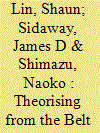

|
|
|
|
|
| Summary/Abstract |
As frame for the set that follows, this article first considers the range of theoretical interpretations of China's Belt and Road Initiative (BRI). Our focus, however, is on a related yet distinct set of questions. Rather than theorising BRI per se, we approach BRI as a source of theoretical implications and reflection – asking what it signals and implies for wider cultural, economic, political, social and urban theories, and for histories of and afterlives of imperial geopolitics.
|
|
|
|
|
|
|
|
|
|
|
|
|
|
|
|
| 17 |
ID:
145991
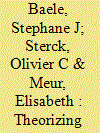

|
|
|
|
|
| Summary/Abstract |
While recent research has demonstrated the key role played by emotion in conflicts, the interplay between the individual and collective dimensions of this variable has not yet been fully conceptualized and satisfyingly measured. Focusing on the 2011 Palestinian statehood bid at the United Nations and the United Nations Educational, Scientific and Cultural Organization, this article highlights the circular character of group-based emotional dynamics and stresses the importance of “emotional worldviews” and “emotional configurations.” We subsequently provide an innovative, robust, and repeatable quantitative method for the direct measuring of these two components. This threefold contribution—theoretical, methodological, empirical—completes recent models (chiefly the appraisal-based framework) and unfolds new research avenues for the study of the role of individual and collective emotions in conflicts.
|
|
|
|
|
|
|
|
|
|
|
|
|
|
|
|
| 18 |
ID:
144456
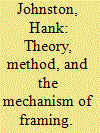

|
|
|
|
|
| Summary/Abstract |
This article bridges two literatures: research on social movements, in which framing is widely recognized as an important causal mechanism; and research in civil wars and insurgencies, which tends to deemphasize cultural-interpretative factors such as framing. We argue that it is important that insights of framing be applied to insurgencies because there is a fundamental framing action that often occurs. We have in mind civil wars in which oppositional activists, who previously had pursued nonviolent tactics, apply a prognostic frame of ‘what to do’ that specifies armed conflict. Drawing on methodologies of subject–verb–object grammars used to analyze political texts, this article elaborates a comprehensive approach to framing that involves not only shifts in the < verb>, or specifications of ‘what to do’, but also shifts in a < subject>, or definitions of ‘who we are’, and in an < object>, or the targets of ‘who the enemy is’. We use organizational texts from the first Palestinian Intifada to demonstrate the approach. We also consider frame shifts in the Syrian civil war, inferring the grammatical structures of the frame transformations for secularists and radical Islamists from events leading up to the outbreak of sustained violence. This article proposes that a three-part grammatical approach captures the interrelated elements of a full and robust framing mechanism that is generalizable. It represents an advance over framing perspectives that typically isolate identity and target components from action prognoses, therefore missing the synchronization among the three, and how limits and/or opportunities for one shape the definition of the others.
|
|
|
|
|
|
|
|
|
|
|
|
|
|
|
|
| 19 |
ID:
139418
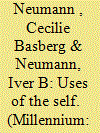

|
|
|
|
|
| Summary/Abstract |
If the scholarly self is irretrievably tied to the world, then self-situating is a fruitful source of data production. The researcher becomes a producer, as opposed to a collector, of data. This how-to paper identifies three analytical stages where such self-situating takes place. Pre-field; there is autobiographical situating; in-field, there is field situating, and post-field, there is textual situating. Each of these stages are presented in terms of the three literatures that have done the most work on them – feminism, Gestalt, and poststructuralism. A number of how-to examples are used to illustrate. In conclusion, we discuss how two different methodological commitments to situatedness, which Jackson (2010) dubbed reflexivist and analyticist, give rise to two analytically distinct ways of using the scholarly self for data production. Reflexivists and analyticists approach data production from opposite ends of the researcher/informant relationship. Where a reflexivist researcher tends to handle the relation between interlocutor and researcher by asking how interlocutors affect the researcher, an analyticist researcher tends to ask how the researcher affects them.
|
|
|
|
|
|
|
|
|
|
|
|
|
|
|
|
| 20 |
ID:
190702
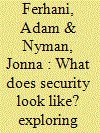

|
|
|
|
|
| Summary/Abstract |
IR’s visual turn has emphasised visual analysis over visual method, centring images of war and crisis. Meanwhile security studies centres great power politics and moments of rupture. Together, they reinforce a dominant image of security as spectacular. This article unites two ethnographic projects focused on everyday security: one examining everyday security landscapes in China, and one examining health security at the UK border. Both found a gap between the dominant image of security and what we saw, and explored this gap through photography. Building on the everyday and visual turns, the article introduces interpretive photography as method to make two contributions. The first is methodological: it introduces interpretive photography as a distinct critical qualitative method that operates on five modes: enabling the seeing-capturing-making-sharing of visual artefacts, it also disrupts dominant visions and contributes to the construction of international relations. The second contribution is empirical: a deeper, richer account of what security looks like. While the discipline associates security with emergency politics or a state of exception, Nyman’s photographs show the exception-made-everyday, while Ferhani’s photos reject the exception by showing banal routines. In this way, photography engages the visuality of security, and can change how we see security.
|
|
|
|
|
|
|
|
|
|
|
|
|
|
|
|
|
|
|
|
|